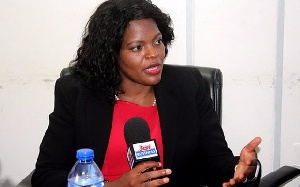 CEO of Vodafone Ghana, Yolanda Zoleka Cuba
CEO of Vodafone Ghana, Yolanda Zoleka Cuba
Vodafone Ghana, the country’s second-largest mobile telephony service provider, has said it is in “constant” talks with the National Communications Authority (NCA) over the pricing of the 4G LTE spectrum, which it considers to be too high, and cannot wait to get it for its subscribers.
The telecom sector regulator auctioned the 4G LTE spectrum for US$67.5 million, and aside the wireless broadband operators like Surfline and Busy, MTN is the only telecom operator with the licence.
The other telecom operators have argued that the price is too high, but Communications Minister, Ursula Owusu, said in July, that: “there is no way we will go below that amount now.”
The CEO of Vodafone Ghana, Yolanda Zoleka Cuba, told the B&FT that: "Our desire is to be deploying 4G at this material moment; however, we cannot because we still hold the position that the US$67.5 million price tag on the spectrum set by the regulator is excessively high.”
She said: “If it was affordable, to be honest, we would have acquired it. Let me say there is nothing wrong with our competitor MTN that acquired one of the two spectrums available. However, we were just disappointed at the price, and that is a price that we cannot meet at this point in time. But we are talking to the regulator constantly and looking for ways and alternatives to ensure that our customers actually get to experience 4G as well.
She went on to say that the company is exploring a number of options in its discussions with the regulator, “and it will be too premature to discuss anything outside an agreement.”
Ms Zoleka Cuba, who took over as the CEO of Vodafone Ghana a little over a year ago, stated that her biggest challenge has been the entire 4G discussion and the progress around it, which has just been slower than she would have wanted.
MTN Ghana bought one of two 4G spectrum licences from the NCA which enabled it to launch 4G LTE services in Ghana last year, even though it also grumbled about the auction price.
Whilst arguing that the price must come down to give a fair chance to all players in the industry, Yolanda Cuba, however, agreed that the spectrum must be allocated to entities that capable of making efficient use of it to improve quality of service.
Access to spectrum, she maintained, feeds into the growth of today's modern economy and the regulator needs to take this into account going forward.
The term 4G applies to fourth-generation wireless, the stage of broadband mobile communications that supercedes the third generation (3G), with superior benefits like better voice quality, quicker file downloads, and faster streaming of videos.
Meanwhile, Ms Zoleka Cuba told the B&FT that: “I think for the first year of me being the head of Vodafone, we have recorded some remarkable achievements. We have had a double-digit growth in revenue and more than 60% growth in data.”
She added that Vodafone has seen some fantastic growth in the year, considering some of the awards it has received, including that for the best telecom brand.
“We also have started our digitization vision and we have already actually been recognised for making that penetration in that space. We want to make sure that no one is left behind in this digital world,” she noted.